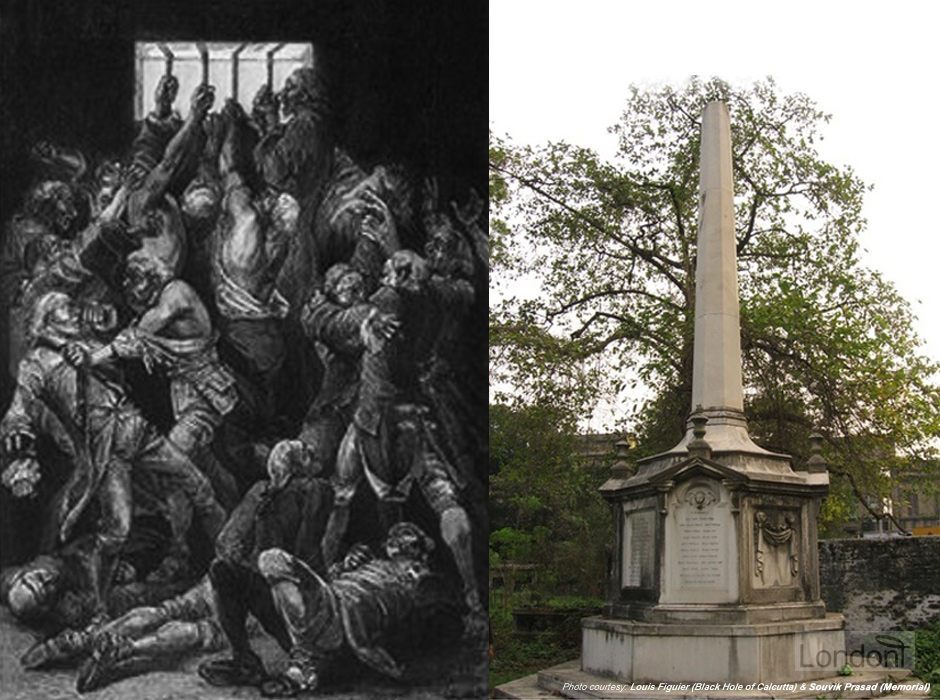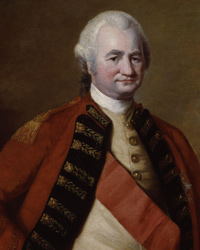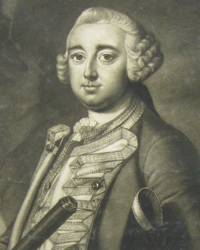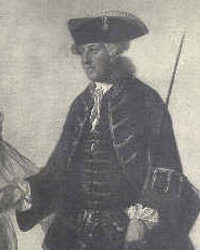
Black Hole of Calcutta
On 4 June 1756, Siraj-ud-Daulah occupied the English factory at Cassimbazar and marched towards Kolkata. On 20 June 1756, Fort William surrendered to his forces. Given the hostility and suspicion that existed between the Nawabs and the English over the last 100 years, the English interpreted Siraj’s act as being 'motivated by the desire to plunder'. The Nawab led a detachment of 3,000 men to surround the fort and factory of Kasimbazar (Cossimbazar) and took several British officials as prisoners, before moving to Calcutta.
The defences of Calcutta were weak and negligible. The garrison consisted of only 180 soldiers, 50 European volunteers, 60 European militia, 150 Armenian and Portuguese militia, 35 European artillery-men and 40 volunteers from ships and was pitted against the Nawab’s force of nearly 50,000 infantry and cavalry. The city was occupied on 16 June 1756 by Siraj’s force and the fort surrendered after a brief siege four days later.
Once Fort William was captured Siraj-ud-Daulah returned to Murshidabad, his capital, and left Kolkata in charge of his generla Manikchand.
Though many Englishmen had escaped the onslaught in Fort William, 146 were caught and imprisoned in a small room 18 x 14 14 feet (5.5 × 4.3 m) in size on the hot summer night of 25 June 1756. This common dungeon of Fort William known as The Black Hole only had two small windows, and was originally employed by the British to hold only six prisoners. Next morning, the doors of the dungeon were opened and only 23 of the 146 walked out, the rest died of suffocation, heat exhaustion and delirium.
In pursuit of one of his own family who had escaped from his vengeance, he [Siraj-ud-Daulah] marched upon Calcutta with a large army. Many of the English fled down the river in their ships. The remainder surrendered after a brave resistance, and were thrust for the night into the 'Black Hole' or military jail of Fort William, a room about 18 ft sq, with only two small windows barred with iron. It was our ordinary garrison prison in those times of cruel military discipline. But although the Nawab does not seem to have been aware of the consequences, it meant death to a crowd of 146 English men and women in the stifling heats of June. When the door of the prison was opened next morning, only 23 persons out of 146 remained alive.
It appears that the Nawab was unaware of the conditions in which his prisoners were held which resulted in the unfortunate deaths of most of the prisoners. Later account that Siraj-ud-Daulah knew about the incident were "fabricated to depict him as a monster of cruelty".
After the fall of Fort William, Siraj defeated and killed Shaukat Jang, his cousin and rival but could not follow a firm policy after these victories in the initial phase of his rule. Several reasons might be given to account for his later indecisiveness. Probably, the young nawab underestimated the strength of the English. He could not also fully count upon his ministers and officials, some of whom were carrying on treacherous negotiations with the English. Siraj himself was basically an imabalanced and pleasure-loving young man.
After the Black Hole of Calcutta disaster, the English took shelter in Fulta which was heavily protected by their fleet. From there they appealed to Siraj-ud-Daulah to restore their former trading rights and privileges at Kolkata and also secretly tried to win over to their side Manikchand, the officer in charge of Black Hole of Calcutta massacre, Omnichand, a rich and prominent merchant, and Jagat Seth, an influential banker.
Clive & Watson sent from Madras
As soon as the news of the fall of Kolkata reached to Madras Council, it decided to send a well-equipped army and a squadron of the King's ships with the task of recapturing Kolkata. Led by Colonel Robert Clive and Admiral Charles Watson, they promptly sailed to the mouth of the Ganges. The expedition arrived in Bengal on 14 December 1756. Watson and Clive next adopted an aggressive stand. On 17 December Watson wrote a letter to Siraj-ud-Daulah asking him to restore the old rights and privileges of the East India Company, and to pay compensation for the losses caused by the recent attacks.
 Colonel Robert Clive ()
Colonel Robert Clive ()  Admiral Chalres Watson ()
Admiral Chalres Watson ()
On 2 January 1757, Clive recovered Kolkata with little fighting. Manikchand, the Nawab’s officer in charge of Kolkata, having taken bribes from the English, surrendered to the enemy after making a token show of resistence.
The Nawab at this stage appears to have lost heart as a result of these developments, particulary due to the treachery of his officers, and decided to adopt a soft policy. He came down to Calcutta and signed a treaty with the English on 9 February 1757, accepting all their demands
English defeats French
It is possible that matters might have ended thus, if a fresh cause of hostilities had not suddenly arisen. War had just been declared between the English and French in Europe so the Company then turned their attention to the French threat in Bengal. They attacked the French fort town of Chandernagar and by March 1757 forced the French army to surrender.
Driven out of Chandernagore, the French took shelter in the Nawab’s court. The Nawab, enraged by this breach of the peace within his dominions, took the side of the French. His former hatred of the British returned. He allied with the French East India Company and took to the field of battle at Plassey. But apprehending an alliance between the Nawab and the French, the English succeeded in sending the French away with help from the treacherous officials of the Nawab.
Mir Jafar conspires with British and signs hidden treaty
Noticing the internal rift within the Nawab's court, William Watts, the chief of the Kasimbazar (or Cossimbazar) factory of the British East India Company who was proficient in Bangla, Hindustani and Persian languages, informed Colonel Clive about a conspiracy at the court to overthrow the ruler. Colonel Clive communicated this to the BEIC's Council in Calcutta and they agreed to hatch a plan to overthrow the Nawab.
In England the trading operations of the Company became a matter of national interest, especially during the Whig supremacy when the Company became a banker for national savings, and a primary source of loans to the government. The expansion of the Bengal sector of the Englsih international trade made it coveted both by natives and Englishmen. It was a curious accident of history that this growth in the Bengal trade with England coincided with the era of waning Mughal authority.
 William Watts (1722 - 1764) Chief of Kasimbazar (or Cossimbazar) factory of the British East India Company. Lived in Bengal for a long time and was proficient in Bangla, Hindustani and Persian languages. Close contact with the great merchant princes of the time. Acted Colonel Clive's spy in Nawab's court at Murshidabad.
William Watts (1722 - 1764) Chief of Kasimbazar (or Cossimbazar) factory of the British East India Company. Lived in Bengal for a long time and was proficient in Bangla, Hindustani and Persian languages. Close contact with the great merchant princes of the time. Acted Colonel Clive's spy in Nawab's court at Murshidabad.
The Calcutta Council had no intention to remain satisfied with January 1757 treaty with Siraj ud-Daulah and instead drew up a secret treaty with Mir Jafar http://murshidabad.net/history/history-topic-mir-jafar.htm on 1 May 1757 promising to raise him to the throne of Nawab in return for support in the field of battle and the refund of large sums of money as compensation for the Black Hole of Calcutta attack. Mir Jafar agreed. On 5 June 1757 William Watts conducted the conspiracy with remarkable diplomatic skill, secrecy and courage by visiting Mir Jafar and obtaining his oath of allegiance, and five days later, Clive concluded the treaty with these conspirators to execute the plan. As Admiral Watson refused to sign this treaty, Clive got his signature forged on the document.
Thus on 14 June 1757 Robert Clive sent a declaration of war to Siraj. Siraj ud-Daulah had suspected that Mir Jafar would conspire with the British, therefore the following day after the declaration he had him arrested in his palace. But Mir Jafar promised him that he wouldn't join the British in the field of battle and would support him from the left flank. Siraj ud-Daulah then ordered his entire army to move to Plassey but the troops refused to quit the city until the arrears of their pay were released. The delay caused the army to reach Plassey only by 21 June. Learning of this reconciliation Clive faced a dilemma, however, Mir Jafar had sent messages to Clive, declaring his intention to uphold the treaty between them.
